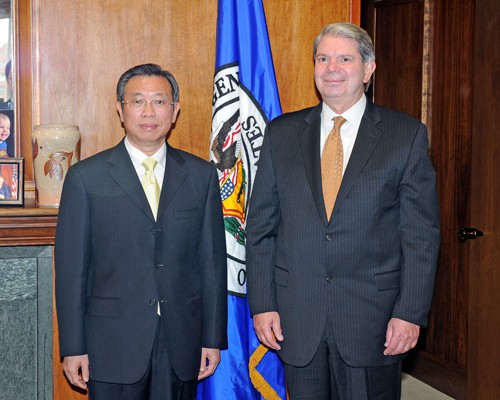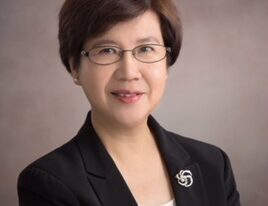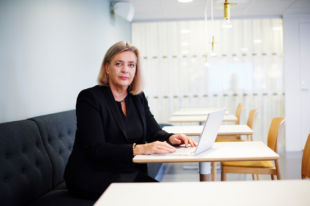CNAO, GAO Leverage Expertise to Generate Results

In 2012, heads of the SAIs of China and USA signed a Memorandum of Understanding (MoU). According to the MoU’s objective, “The participants intend to establish, improve, and develop a framework for cooperation in national audit and promote effective interaction between the participants on the basis of equality, reciprocity, and mutual benefit.” The MoU has allowed the National Audit Office of the People’s Republic of China (CNAO) and the United States Government Accountability Office (GAO) the opportunity to leverage expertise to develop effective knowledge sharing, which has generated valuable results.
The Auditor General (AG) of China visited GAO in July 2011 and delivered a speech to U.S. government auditors on “National Audit and National Governance”. The AG of China introduced CNAO’s practices and experiences in promoting good governance in China through encouraging rational power disposition and operation; providing timely, objective and reliable information for decision-making; accelerating the implementation of governance policy measures; and detecting economic and societal weaknesses and risks in an effort to protect national security and the fundamental interest of the people. In 2012, The U.S. Comptroller General visited CNAO and gave a speech titled “The Evolving Role of Auditing in Helping Meet Dynamic National and International Challenges”, explaining to Chinese auditors the history of government auditing in the U.S., as well as GAO’s efforts in three key areas—oversight, insight and foresight—pointing out GAO’s foresight activities that identify emerging trends and challenges. Through these high-level visits, the SAIs of China and the U.S. have learned from each other, especially in regard to innovation and improvement of audit concepts and approaches.
Collaboration within the INTOSAI framework has intensified the discussions on major INTOSAI issues between CNAO and GAO. As Chair of the INTOSAI Governing Board, the AG of China initiated the Supervisory Committee on Emerging Issues and invited the U.S. Comptroller General to work as the committee Vice Chair. Since then, they have held several meetings to discuss crucial issues of common interest faced by INTOSAI. Furthermore, the INTOSAI Working Group on Financial Modernization and Regulatory Reform (WG FMRR) is chaired by the U.S. Comptroller General, and the CNAO acts as one of the subgroup leaders. The two SAIs have actively shared experiences and continue to explore ways for SAIs to fulfill their roles. Together, CNAO and GAO have also contributed to INTOSAI’s input into the 2030 Agenda for Sustainable Development in relation to SAIs functions.
As part of the MoU, the two SAIs conduct regularly scheduled international seminars to facilitate practical exchanges of auditing. The inaugural seminar was held in Nanjing, China in 2014 under the theme “Implementation of Financial Regulatory Policies”. In addition to GAO and CNAO, SAIs of Australia, Germany, Korea and the UK also attended the event, where they discussed many issues related to financial crisis, financial regulations, consumer financial protections, curbing corruption and envisaged the prospect of the development of financial regulation and financial system audit in the post-crisis era.
At the conclusion of the event, participants reached several common understandings (which were submitted to the INTOSAI WG FMRR) on the topic and identified areas to shape future collaborative efforts. These were:
- SAIs have an important role to engage in financial regulatory system oversight;
- Countries must improve financial regulation in a post-crisis era;
- SAIs should continue monitoring for subsequent repercussions from an international financial crisis;
- SAIs have a role in protecting financial consumers; and
- SAIs should continue to innovate and explore new audit methodologies against the backdrop of big data analysis.
In 2015, CNAO and GAO conducted a second international seminar on “The Use of Foresight and Data Analytics in Auditing and Government Accountability” in Washington, D.C. The theme, reflecting the concerns of governments and citizens, aimed to facilitate dialogue on the ways in which SAIs can use foresight tools and big data analytics to improve auditing techniques and to ensure SAIs consider new auditing technologies and methodologies in a rapidly changing environment. The seminar highlighted expectations of citizens for the SAIs to use foresight to potentially see, and prevent, an issue (as opposed to reporting after the fact), as well as correcting existing problems.
This seminar welcomed nearly thirty participants from the SAIs of China, USA, Brazil, Canada, Finland, Korea, Netherlands, New Zealand and the UK along with experts from outside the audit community, including Policy Horizons Canada and the Institute for Alternative Futures. It specifically focused on three topics, and the seminar found there was strong interest among the participants to continue the efforts in the area of foresight and data analytics and expand the group:
- Applying foresight to the accountability community;
- Data analytics and the implications for the audit community; and
- Developing collaborative networks of foresight work.
The multi-dimensional exchanges and cooperation between the two SAIs have demonstrated intense vitality and huge potential, which produced sound results for the benefit of SAIs, governments, citizens and partners in the global accountability community and will facilitate the common development of all parties involved.
A third joint seminar will be held in September 2016 in Beijing on the theme of “Performance Audit of Programs Designed to Secure the Well-Being and Financial Security of its Citizens”, considering both countries have huge social security programs and face such common issues as aging populations and growing social security demands.
The two heads of SAIs of China and the U.S. meet regularly to review existing cooperation practices and discuss ideas on exchanges under the MoU. At the working level, the two SAIs also maintain smooth communication on INTOSAI and bilateral affairs, and the two SAIs will continue to work together to propel the existing win-win cooperation to new heights.





